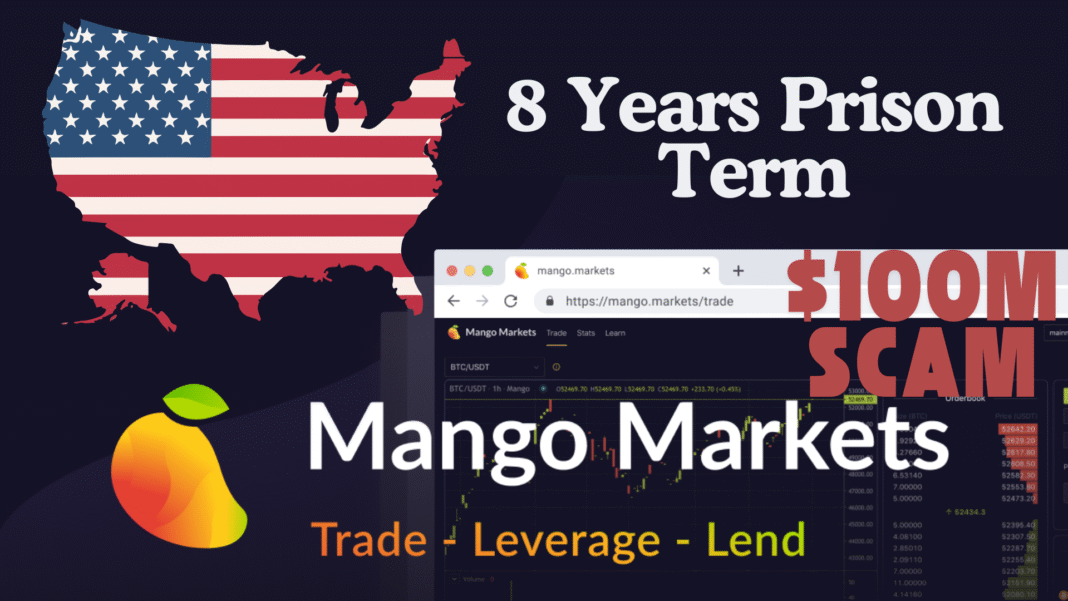U.S. federal prosecutors have recommended a prison sentence of between 6.5 to 8 years for Avi Eisenberg, the individual responsible for the 2022 Mango Markets exploit that rocked the decentralized finance (DeFi) space.
In a formal sentencing recommendation submitted to a district judge, prosecutors proposed a term of 78 to 97 months.
The incident cited the severity of Eisenberg’s actions and their broader impact on investor confidence in DeFi platforms.
Eisenberg’s sentencing is scheduled for May 1, and the crypto industry is closely monitoring the outcome, as it may set a critical precedent for how the U.S. judicial system handles DeFi-related cybercrimes moving forward.
Defense Claims “Legal Trading Strategy” as Prosecutors Argue Intent to Defraud
Eisenberg’s legal team has maintained that his activities did not constitute a crime, framing them as a “legal trading strategy” that merely took advantage of flaws in Mango Markets’ code.
He argued that users of decentralized protocols inherently accept risks associated with smart contract interactions.
However, prosecutors have rejected this claim, asserting that Eisenberg acted with full knowledge and intent to deceive and manipulate.
They allege that his goal was to artificially inflate token prices, create fictitious value, and then extract funds by exploiting the system’s vulnerabilities, behavior they classify as outright fraud.
The court is now tasked with deciding whether Eisenberg’s explanation constitutes a valid legal defense or a calculated attempt to evade accountability.
Mango Markets Exploit Caused Over $100 Million in Losses, Shaking DeFi Trust
The exploit, which took place in October 2022, resulted in more than $100 million in losses for Mango Markets, a prominent DeFi platform operating on the Solana blockchain.
Eisenberg allegedly manipulated the value of the platform’s native token, MNGO, by opening large leveraged positions to inflate its price.
He then used this artificially elevated value as collateral to borrow and drain vast sums from the protocol.
The attack left Mango Markets with bad debt and sparked widespread debate across the crypto industry about the fragility of DeFi platforms.
In the aftermath, Mango Markets was forced to reassess its security infrastructure and risk models, highlighting the urgent need for tighter safeguards and possibly regulatory oversight.
Broader Crackdown on Crypto Crimes Gains Momentum Globally
The Eisenberg case is part of a broader wave of legal actions targeting crypto-related crimes around the world.
In China, a court recently sentenced nine individuals to up to 15 years in prison for defrauding over 66,000 Indian citizens through a fake investment scheme involving USDT, resulting in $6 million in losses.
Meanwhile, in South Korea, prosecutors are seeking a 10-year sentence for an investor who attacked a crypto CEO after losing 100 BTC in the collapse of Haru Invest.
The global scope of these cases underscores the increasing pressure on governments and judicial systems to enforce laws in the crypto space.
Even former FTX CEO Sam Bankman-Fried, currently serving time, has re-entered the spotlight by sharing insights into prison life and revealing previously undisclosed political donations.
Collectively, these developments signal a new era of accountability for actors in the volatile world of digital finance.
Also Read: CluCoin Founder Sentenced To Over Two Years In Prison For Wire Fraud, Ordered To Pay $1.14 Million


